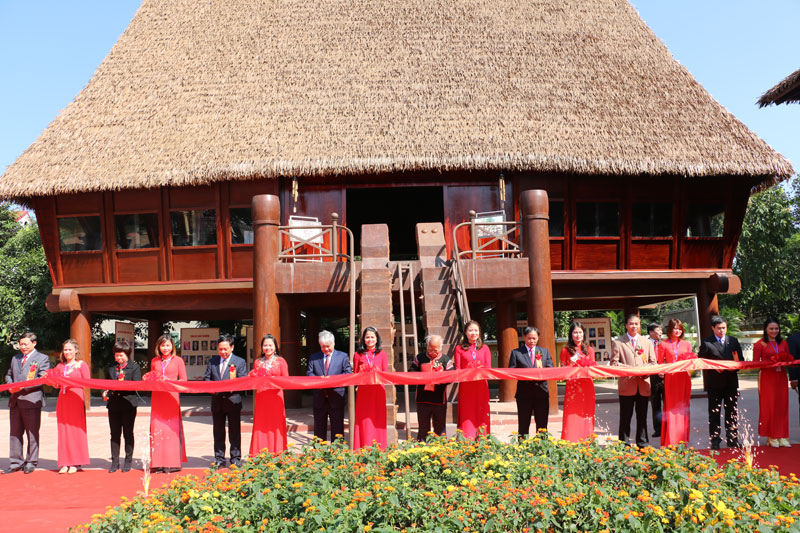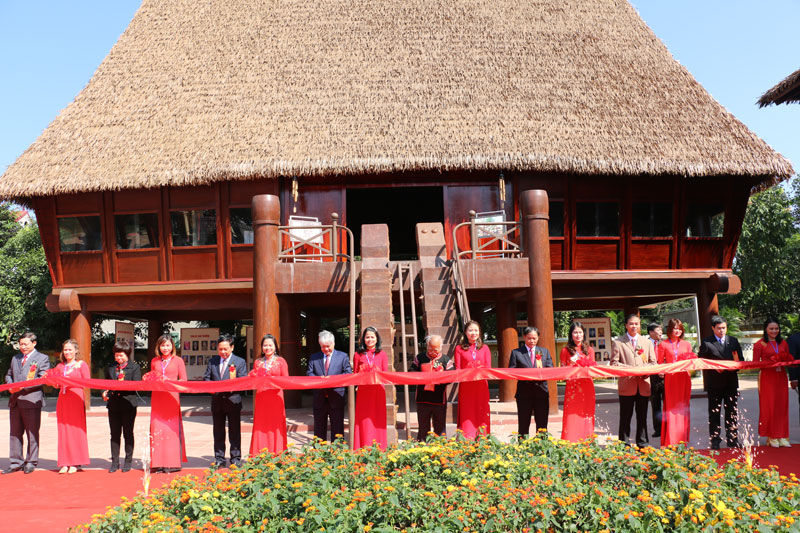
(HBO) – The Government’s Committee for Ethnic Minority Affairs and the Hoa Binh provincial People’s Committee held a ceremony on December 5 to mark the 60th founding anniversary of the School for Ethnic Minority Cadres of the Southern Region and inaugurate a memorial site for the school.

Delegates cut the ribbon to inaugurate the Relic Area.
In 1954, President Ho Chi Minh and the Party Central
Committee made a strategic decision that was sending children of cadres,
soldiers and people in the southern region to the north to receive training.
Among them, more than 2,000 were from ethnic minority groups.
To improve the living and learning conditions
for the students, in December 1958, the then Central Committee for Ethnic
Affairs decided to establish a training area for the southern region’s ethnic
minority cadres which was later renamed School for Ethnic Minority Cadres of
the Southern Region. The school was located in Dong Tam commune, now Chi Ne
township of Lac Thuy district, Hoa Binh province.
During the 15 years the school was based in Lac
Thuy, it always received favourable conditions and assistance from local
authorities and residents. Thousands of cadres and students graduated from this
school and became officials and scientists. Some of them held important
positions of the Party, the State, armed forces and localities nationwide.
Addressing the ceremony, Minister-Chairman of
the Committee for Ethnic Minority Affairs Do Van Chien highly valued Hoa Binh
province’s support for the memorial site building. He expressed his hope that
local authorities and residents will treasure and introduce the site’s values
to younger generations and visitors.
Secretary of the provincial Party Committee Bui
Van Tinh described the school as a special education model showing the Party,
State and President Ho Chi Minh’s attention to education for ethnic minorities,
as well as the solidarity among ethnic groups and between the southern and
northern regions.
He asked the Party organisation, administration
and people of Lac Thuy district to uphold their sense of responsibility towards
the preservation, rehabilitation and promotion of the relic site’s values so
that the site will become a gathering venue for its alumni and a place for
educating the young on history and revolutionary traditions.
On this occasion, the Ethnic Minority Affairs
Committee presented 50 million VND (nearly 2,200 USD) as a gift to the Lac Thuy
Association for Promoting Education. The school’s alumni also presented 50
million VND to the district./.
In the spirit of "Party members go first, the people follow”, all households of Party members in the Doan Ket sub-region in Da Bac town, Da Bac district, voluntarily removed gates and fences, and donated land when the road expansion project passed through their properties. Inspired by their example, 68 households in the sub-region quickly followed suit, contributing over 1,400 sq.m of residential and perennial cropland to widen the main road through the residential area. The exemplary role of Party members in Doan Ket stands as a shining example of studying and following President Ho Chi Minh’s thought, morality, and lifestyle.
The Hoa Binh provincial People's Committee held a monthly meeting on May 29 to assess the implementation of socio-economic development tasks in the first six months of 2025, the progress of key projects, and some other important issues.
During his lifetime, President Ho Chi Minh always expressed his deep affection and special concern for children and youth. He once emphasized: "Caring for and educating children well is the responsibility of the entire Party and the entire people”; "First of all, the family (i.e. grandparents, parents, siblings) must do this job well”. "the Party Committees…, the Children’s Committee, the Youth Union, the education sector, and all related organizations must have specific plans to ensure children grow healthier and more progressive”. His teachings has been remaining valuable and serving as the guiding principles in the work of protecting, caring for, and educating children. In line with this ideology, Hoa Binh Province has continuously been prioritizing and investing resources in the well-being of children in recent years.
Mr. Nguyen Phi Long, the alternate Member of the Party Central Committee and Secretary of the Provincial Party Committee chaired the meeting of the Standing Committee of the Provincial Party Committee to provide opinions on several investment projects within the province. There was the attendance of Ms. Bui Thi Minh, the Permanent Deputy Secretary of the Provincial Party Committee and Chairwoman of the Provincial People’s Council; Mr. Bui Đuc Hinh, the Deputy Secretary of the Provincial Party Committee and Chairman of the Provincial People’s Committee and other members of the Standing Committee; the leaders from other departments, agencies, and some localities.
The Standing Board of the Vietnam Fatherland Front (VFF) Committee of Hoa Binh province held a meeting on May 28 to honour outstanding village elders, village heads, and reputable individuals from local ethnic minority and religious communities.
In mid-May, the provincial Museum organised an exhibition named "Duoi la co Dang Cong san Viet Nam quang vinh” (Under the flag of the glorious Communist Party of Vietnam). This meaningful activity took place in the joyful atmosphere to celebrate the country's major holidays and the Party congresses at all levels for the 2025-2030 term, towards the 14th National Party Congress.



 Delegates cut the ribbon to inaugurate the Relic Area.
Delegates cut the ribbon to inaugurate the Relic Area.